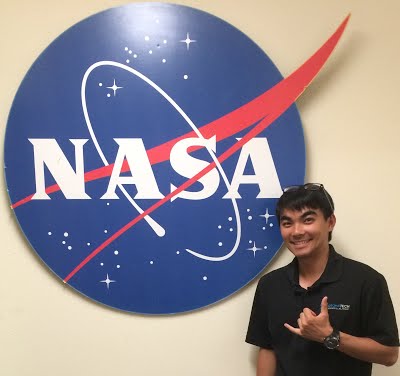
Evan Kawamura received his B.S. degree in 2016 and his PhD degree in 2020 from the University of Hawaii at Manoa, all in Mechanical Engineering. He has mentored over a hundred students in unmanned aerial system projects: University of Hawaii Drone Technologies (UHDT), Autonomous Control Technologies – Unmanned Aerial Systems (ACTUAS), Building User Reconfigurable Drones (NASA interns), and Real World Design Challenge (Guam high school students).
He was a Pathways intern at Pearl Harbor Naval Shipyard from 2015 to 2018, a NASA One Stop Shop Initiative (OSSI) summer intern in 2018, a Kellogg Brown & Root Stinger-Ghaffarian (KBR-SGT) summer intern in 2019, and a NASA Ames Research Center Pathways intern from 2019 to 2020. In 2021, his Pathways internship was converted to a full-time Computer Engineering position at NASA Ames Research Center.
He has experience with multirotor and fixed-wing UAVs and has authored or co-authored research papers in guidance, navigation, and control for UAVs. Dr. Kawamura received the Hawaii’s STEM Engaged Pathways (HESTEMP) Certificate of Achievement at the 2018 May HESTEMP conference and the 2019 ARCS Scholar Kresser Award in Engineering during his doctoral studies.
Evan's VIP Experience
We spoke to Evan about his experience in the UH VIP Program. This is his response:
Time flies by when one is having fun! It is a cliché, but that is exactly how I feel today as I reflect on when I first joined University of Hawaii Drone Technologies (UHDT) in Spring 2014. I finished senior design with UHDT in Spring 2016 and continued as a mentor throughout graduate school, until graduating in December 2020. I enjoyed several aspects of being part of the VIP UHDT team. I enjoyed the hands-on experience and the opportunities to apply classroom knowledge to solve real-world problems or develop designs. I liked the development and growth opportunities as an engineer working on a multi-disciplinary team with various class standings. Developing leadership skills, writing reports, providing presentations, organizing team meetings and hierarchical structures, managing the project, maintaining and modifying the timeline, and learning how to work with different personalities are the main areas I grew in. I appreciated the opportunity to meet and work with students outside my major and class standing because it was beneficial training before entering the workforce as an engineer. Making connections, forming relationships and bonds, and building a network is a considerable benefit for forming life-long friendships and graduate school and employment opportunities such as finding potential authors for letters of recommendation or reference.
My VIP experience as a student did put me on the fast track to maturity and engineering development. Without it, I would not be as knowledgeable or confident in making technical decisions or working with others outside my major or class standing. As a VIP student, I quickly learned that our majors and class standings do not matter. What matters more is that we are all coming together with diverse backgrounds and levels of expertise to create the best products possible.
To the current and future VIP students, shop around all the available projects, then ensure that you buy into the project you want the most because it will ideally be an investment throughout the rest of your undergraduate career. I still remember the invaluable lessons I learned, and how a well-oiled engineering team harmoniously operates with efficiency, effectiveness, and enthusiasm. One of my mentors taught me that an attitude is a little thing that can make a big difference, so do not forget to have a good attitude, which is, of course, easier said than done.